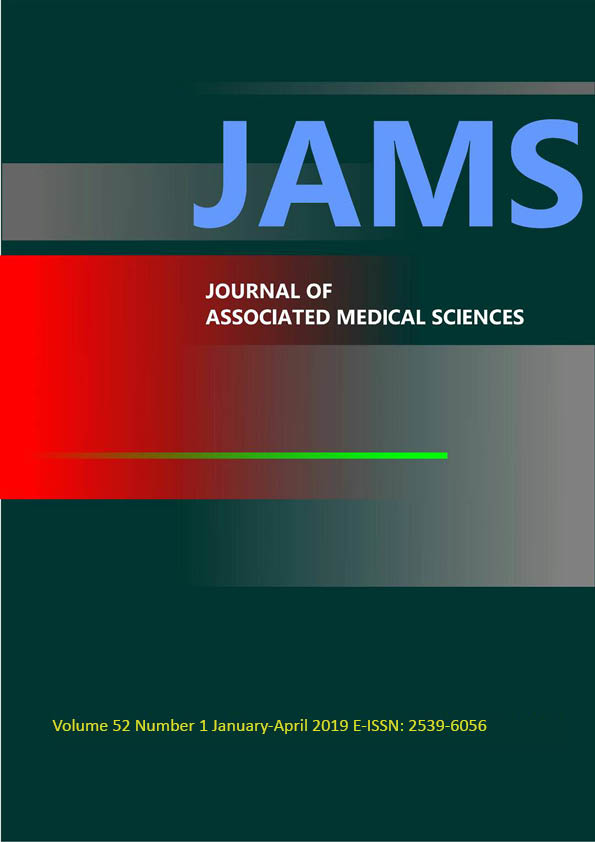Relationship between clinical features of dizziness and self-perceived dizziness handicap
Main Article Content
Abstract
Background: Dizziness symptoms have a negative impact on daily activities and quality of life. The relationship between clinical features of dizziness and self-perceived dizziness handicap would gain a better understanding of impact of dizziness.
Objectives: To investigate the correlations of the clinical features of dizziness symptoms and the self-perceived dizziness handicap.
Materials and methods: Fifty participants (13 men and 37 women), aged between 18-65 years old, were recruited from the Otolaryngology clinic. All participants had experienced dizziness at least one month. The clinical features of dizziness measured were intensity (a 10-cm Visual Analogue Scale), frequency (times/week), duration (minutes each episode), and time of onset (months). The self-perceived level of handicap was measured using the Thai version of Dizziness Handicap Inventory (DHI-TH).
Results: The total score of DHI-TH was positively correlated with dizziness intensity and frequency (r=0.65 and 0.48, respectively, p<0.01). The subscale scores (physical, emotional and functional) were positively correlated with dizziness intensity and frequency (r ranged from 0.37 to 0.59, p<0.01). There were no correlations between the total and subscale DHI scores and duration and time of onset (p>0.05).
Conclusion: Self-perceived dizziness handicap as measured by the DHI-TH had a positive correlation with intensity and frequency of dizziness.
Article Details

This work is licensed under a Creative Commons Attribution-NonCommercial-NoDerivatives 4.0 International License.
Personal views expressed by the contributors in their articles are not necessarily those of the Journal of Associated Medical Sciences, Faculty of Associated Medical Sciences, Chiang Mai University.
References
[2] Chang J, Hwang SY, Park SK, Kim JH, Kim HJ, Chae SW, et al. Prevalence of Dizziness and Associated Factors in South Korea: A Cross-Sectional Survey From 2010 to 2012. J Epidemiol 2018; 28: 176-84. doi: 10.2188/jea.JE20160113.
[3] Colledge NR, Wilson JA, Macintyre CC, MacLennan WJ. The prevalence and characteristics of dizziness in an elderly community. Age Ageing 1994; 23: 117-20.
[4] Chan Y. Differential diagnosis of dizziness. Curr Opin Otolaryngol Head Neck Surg 2009; 17: 200-3. doi: 10.1097/MOO.0b013e32832b2594.
[5] Bronstein AM, Golding JF, Gresty MA, Mandala M, Nuti D, Shetye A, et al. The social impact of dizziness in London and Siena. J Neurol 2010; 257: 183-90. doi: 10.1007/s00415-009-5287-z.
[6] Koo JW, Chang MY, Woo S, Kim S, Cho YS. Prevalence of vestibular dysfunction and associated factors in South Korea. BMJ open 2015; 5: e008224.
[7] Pluijm SM, Smit JH, Tromp EA, Stel VS, Deeg DJ, Bouter LM, et al. A risk profile for identifying community-dwelling elderly with a high risk of recurrent falling: results of a 3-year prospective study. Osteoporos Int 2006; 17: 417-25. doi: 10.1007/s00198-005-0002-0.
[8] Yardley L, Putman J. Quantitative analysis of factors contributing to handicap and distress in vertiginous patients: a questionnaire study. Clin Otolaryngol Allied Sci 1992; 17: 231-6.
[9] Jacobson GP, Newman CW. The development of the Dizziness Handicap Inventory. Arch Otolaryngol Head Neck Surg 1990; 116: 424-7.
[10] Emasithi A, Kosiyaporn N, Prapawanang Z. Translation and validity of the Thai version of the Dizziness Handicap Inventory. 2016. [In press]
[11] Jafarzadeh S, Bahrami E, Pourbakht A, Jalaie S, Daneshi A. Validity and reliability of the Persian version of the dizziness handicap inventory. J Res Med Sci 2014; 19: 769-75.
[12] Kurre A, van Gool CJ, Bastiaenen CH, Gloor-Juzi T, Straumann D, de Bruin ED. Translation, cross-cultural adaptation and reliability of the german version of the dizziness handicap inventory. Otol Neurotol 2009; 30: 359-67. doi: 10.1097/MAO.0b013e3181977e09.
[13] Jacobson GP, Newman CW, Hunter L, Balzer GK. Balance function test correlates of the Dizziness Handicap Inventory. J Am Acad Audiol 1991; 2: 253-60.
[14] Grigol TA, Silva AM, Ferreira MM, Manso A, Gananca MM, Caovilla HH. Dizziness Handicap Inventory and Visual Vertigo Analog Scale in Vestibular Dysfunction. Int Arch Otorhinolaryngol 2016; 20: 241-3. doi: 10.1055/s-0035-1567808.
[15] Perez N, Garmendia I, Garcia-Granero M, Martin E, Garcia-Tapia R. Factor analysis and correlation between Dizziness Handicap Inventory and Dizziness Characteristics and Impact on Quality of Life scales. Acta Otolaryngol Suppl 2001; 545: 145-54.
[16] Son EJ, Lee DH, Oh JH, Seo JH, Jeon EJ. Correlation between the dizziness handicap inventory and balance performance during the acute phase of unilateral vestibulopathy. Am J Otolaryngol 2015; 36: 823-7. doi: 10.1016/j.amjoto.2015.07.011.
[17] Whitney SL, Wrisley DM, Brown KE, Furman JM. Is perception of handicap related to functional performance in persons with vestibular dysfunction? Otol Neurotol 2004; 25: 139-43.
[18] Roscoe JT. Fundamental Research Statistics for the Behavioral Sciences. New York: Holt, Rinehart and Winston; 1975.
[19] Mukaka MM. A guide to appropriate use of Correlation coefficient in medical research. Malawi Med J 2012; 24: 69-71.
[20] Caldara B, Asenzo AI, Paglia GB, Ferreri E, Gomez RS, Laiz MM, et al. Cross-cultural adaptation and validation of the Dizziness Handicap Inventory: Argentine version. Acta Otorrinolaringol Esp 2012; 63: 106-14. doi: 10.1016/j.otorri.2011.09.006.
[21] Castro ASO, Gazzola JM, Natour J, Ganança FF. Versão brasileira do Dizziness Handicap Inventory. Audiol Commun Res 2007; 19: 97-104.
[22] Handa PR, Kuhn AM, Cunha F, Schaffleln R, Gananca FF. Quality of life in patients with benign paroxysmal positional vertigo and/or Meniere's disease. Braz J Otorhinolaryngol 2005; 71: 776-82.
[23] Ten Voorde M, Zaag-Loonen HJ, Leeuwen RB. Dizziness impairs health-related quality of life. Qual Life Res 2012; 21: 961-6. doi: 10.1007/s11136-011-0001-x.
[24] Grimby A, Rosenhall U. Health-related quality of life and dizziness in old age. Gerontology 1995; 41: 286-98. doi: 10.1159/000213696.

